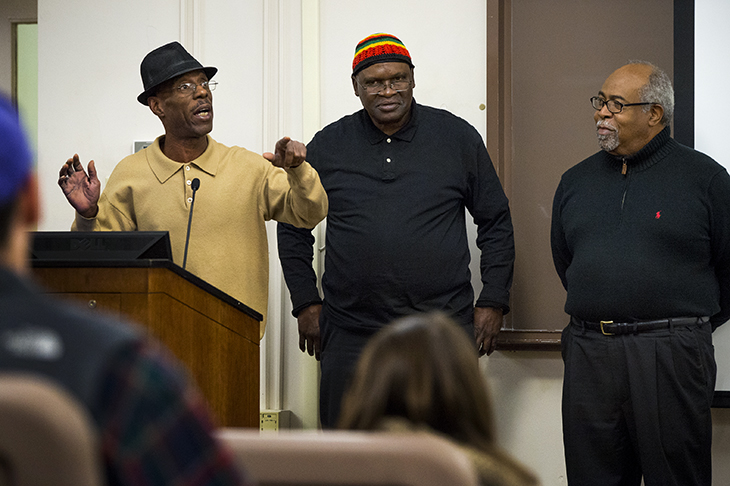From the street to the classroom

Lawyer Winfield Jr., left, and Theophilus Moore, center, speak to students about their former life of crime and prison time. Professor Reginald Parquet, right, leads the Guns and Gangs course at the Tulane School of Social Work, which provides students with real-world experience by hearing from former gang members directly. (Photo by Paula Burch-Celentano)
Why do kids join gangs? What do they get out of gangs? These are questions best answered by those who have lived it. That"s the approach that Reginald Parquet takes in his course, Guns and Gangs.
Parquet, a clinical assistant professor in the Tulane University School of Social Work, has had a long-term interest in the juvenile justice system. In fact, he once ran all of Louisiana"s juvenile correction facilities.
“Those who come speak have turned their lives around for the most part, but they have lived those experiences.”—Reginald Parquet, clinical assistant professor of social work
Since 2005, Parquet has taught the course to hundreds of students while bringing some welcome realness to the classroom.
The class looks at a number of issues such as sociopolitical, sociocultural and socioeconomic variables that contribute to crime and delinquency in the city and the nation. But instead of just reading about those variables in a textbook, the students hear from those who have lived the gang lifestyle.
“We bring in former hardcore gang members,” Parquet said. “Our students hear firsthand from the people that we talk about theoretically, about what their experiences were. Those who come to speak have turned their lives around for the most part, but they have lived those experiences.”
The range of speakers includes those who were gang members 30 years ago to those that left a gang just over a year ago.
“We give these students something that they would not normally get at Tulane,” Parquet said. “They"re able to share those experiences with the speakers, and we look at theories that explain gang activity.”
In the latter part of the semester, students examine effective intervention strategies to stop gang violence, which is guided by the speakers" experiences.
“That experience helps to make the course not just theoretical but real,” said Parquet. “We talk about matters that are real and practical, and that you can"t find in a textbook. It"s been really interesting for me, and I think for the students as well.”
Joseph Halm is marketing/communications coordinator for the Tulane School of Social Work.
